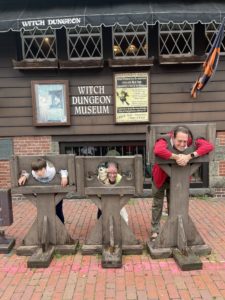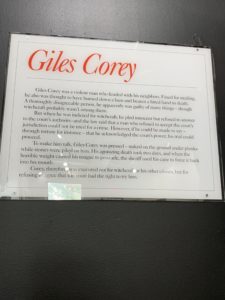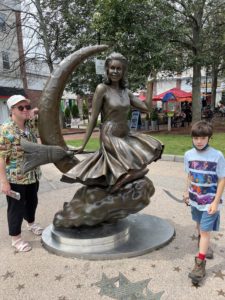Happy (almost) autumn–the witching season!
Self-described “normie Satanist” blogger Stephen Bradford Long followed a similar trajectory as mine, from anguished gay Christian to student of occultism and Tarot. In a provocative post from July, “The Satanic Practice of Learning from Demons”, he explains why he bothers to engage with authors like Jordan Peterson, notwithstanding the latter’s bigoted views. Long doesn’t expect anyone to traumatize themselves by immersing in hostile literature. However, to the extent that we can do it with equanimity, reading problematic authors can be useful for both humility and intellectual exploration. We can come to realize that harmful people are also sometimes right, and conversely, that great influencers and heroes have flaws. Consider how Christianity has been both a route out of despair and a source of new abuse for many of us.
Willingness to learn from demons is a prerequisite for intellectual integrity*, because there is no earnest learning without the practice of good faith. Good faith is the assumption that our interlocuter, no matter how disagreeable we might find them, means what they say and might have some piece of knowledge that we don’t. It is to entertain the terrifying notion that we might be wrong, and they might be right.
However, this does not negate the fact that ideas have consequences, and the ideas of an author might also be utterly destructive and evil when manifested. Engaging with that darkness is valuable, too. Looking into the blackness of an evil ideology is a practice that fortifies you into a wiser human or terrifies and defeats you. I have experienced both and become better for it.
Above all, my Satanism blasphemes the infantile purity that rejects the pursuit of knowledge. There is no safety in reading, and no security in learning. Learning has frequently broken me – it has cost me my faith, my community, and sometimes my sleep and mental health. But it has also liberated me and made me a stronger, better person. The pursuit of safety and avoiding all toxins at all costs means starving the intellect and living with a stultified and brittle mind.
Around the same time, Black feminist author adrienne maree brown wrote this incisive essay, “unthinkable thoughts: call out culture in the age of covid-19”. She observes that marginalized activists too often turn on each other, in the name of “accountability”. American culture right now feels collectively suicidal, and we are acting it out on social media because it’s the only place we feel a sense of agency. “our nation has a tendency towards its own destruction, a doubt of its right to exist, that is rooted in our foundation.” That foundation, of course, is genocide of Black and Native peoples.
we are afraid of being hurt, afraid because we have been hurt, afraid because we have caused hurt, afraid because we live in a world that wants to hurt us whether we have hurt others or not, just based on who we are, on any otherness from some long-ago determined norm. supremacy is our ongoing pandemic. it partners with every other sickness to tear us from life, or from lives worth living.
so we stay put and scream into the void, moving our rage across the internet like a tornado that, without discernment, sucks up all in its path for destruction.
our emotions and need for control are heightened during this pandemic – we are stuck in our houses or endangering ourselves to go out and work, terrified and angry at the loss of our plans and normalcy, terrified and angry at living under the oppressive rule of an administration that does not love us and that is racist and ignorant and violent. grieving our unnecessary dead, many of whom are dying alone, unheld by us. we are full of justified rage. and we want to release that rage.
She asks us to stop fighting over who is “innocent” (another supremacist concept) and start looking for solutions that liberate everyone. “i want us to see individual acts of harm as symptoms of systemic harm, and to do what we can to dismantle the systems and get as many of us free as possible.”
Gates of Light Tarot is a Jewish mystical Tarot site that I just discovered. The post “The Blinding of Isaac and the Eight of Swords” links a card and a Bible story that both arouse big feelings in me. The binding of Isaac in Genesis 22 is the story of Abraham’s test of faith, in which God (supposedly??) commands him to sacrifice his son. But this midrash/Tarot reading, connecting it to the blindfolded woman on the card, suggests that Isaac developed traumatic blindness because of his father’s betrayal of his trust:
The Eight of Swords is the Sefira of Hod, Humility, in Yetzirah. It’s a coded teaching that our personal and family history, our culture and traditions can bind and blind us from seeing truth. And that rather than identify with these ideas, if we are to be free, we must see these ideas for the limitations they are and let go of them.
In Genesis, Isaac blindly repeats the mistakes of his father, from trying to pass off Rebekah as his sister to save his life and by fomenting discord in his family by actively preferring one son over the other. We all repeat the mistakes of our parents in one way or another. And we all inherit their ideas, preconceptions and prejudices. But if we are ever to experience liberating insight, it must begin with liberating ourselves from the short-sightedness of familial and cultural prejudice and by clearly seeing and healing family trauma.
Last month, Image Journal hosted an exciting conversation between two autistic authors, Katherine May (The Electricity of Every Living Thing) and Daniel Bowman Jr. (On the Spectrum: Autism, Faith, and the Gifts of Neurodiversity). The recording is available to watch on Vimeo. Some insights from their talk that I found particularly relatable: Neurodiversity extends to narrative structure, as well. We don’t have to write the disability memoir that mainstream culture expects, with a hero’s journey and a triumph over obstacles. Multi-genre collage may better reflect how our minds work. Moreover, the stereotype of the unemotional autistic person is harmful and inaccurate. Some of us simply don’t express emotion in expected ways, while others are more intensely emotional and have to withdraw periodically for that very reason. For the latter group, the arts can be a great refuge.
Austin Kleon, author of Steal Like an Artist, reminds us to “Make Bad Art Too” in this playful blog post from 2020, which I found via Northampton poet Naila Moreira’s e-newsletter.
“Good” can be a stifling word, a word that makes you hesitate and stare at a blank page and second-guess yourself and throw stuff in the trash. What’s important is to get your hands moving and let the images come. Whether it’s good or bad is beside the point. Just make something.
It’s my abusive mother’s birthday this month. Am I going to send her a card? No! Cheryl Strayed’s Dear Sugar column explains why not:
There is no instruction manual for this kind of sorrow, Estranged Daughter. There is no map. There is only the story you lived through, the story you survived, the story you wrote for yourself, the story you will keep writing. It’s the story of the elegant, heartbreaking, brave way you’ve done the limbo for nearly forty years and the story of the way you will continue to do it, even though it hurts. You didn’t get what most people get and what all of us deserve—a mother who regards you as her richest treasure—and yet here you are at forty. Free. Happy. Comfortable in your skin. Strong. Neither sending a birthday card to your mom or not sending a birthday card to your mom will obliterate that, Daughter.
So, trust your gut. Don’t think about how your mother will react. Think about what you want to do. You can write to her and say what you want to say without opening the envelope of her reply, if you’d like. You can write to her and not send the card. You can silently narrate birthday greetings to her in your mind and breathe them into the air. You can decide to not think of her at all.
Whatever you do, remember that the most powerful thing you learned in the enormous effort it took to shut that door between you and your mother is that there is no door. The door is a metaphor we use so we can pretend there’s something solid to crouch behind. But there isn’t. We are the solid. The door, dear Daughter, is you and me and all the people reading this who relate to these words. It’s built by our strength and our courage; our wisdom and resolve; our suffering and our triumph. The people who harmed us can only come inside if and when we allow them to.
In Witchcraft class this month, we are working on cutting energetic ties to situations and people who are harmful to us. I’ve done a lot of trauma processing in the last decade since I went no-contact with her. But it’s humbling to realize that on a somatic level, some part of me still believes that one or both of us will die without the psychic umbilical cord connecting us.

Even though the cord looks like this. [Image credit: Studio Ghibli, “Princess Mononoke”]
On that note, I highly recommend Tara Westover’s memoir Educated (Random House, 2018), which I just finished reading. Among other things, it’s a stunning depiction of the push-pull between fighting for your own survival and longing to stay connected to your family. The story of her rural Mormon family’s anti-government paranoia and rejection of modern medicine gives insight into the Covid anti-vaxx movement today. Her website links to other useful resources for survivors.









